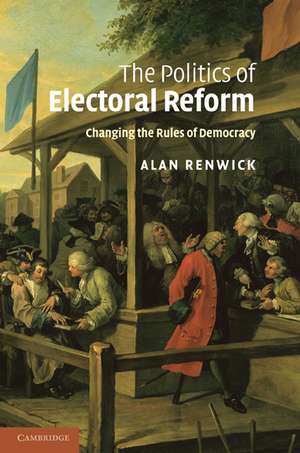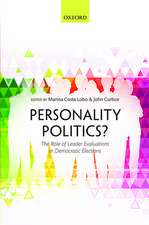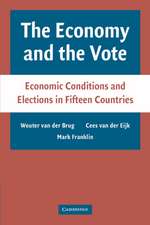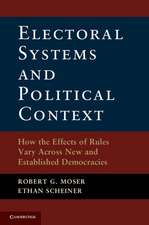The Politics of Electoral Reform: Changing the Rules of Democracy
Autor Alan Renwicken Limba Engleză Paperback – 13 apr 2011
| Toate formatele și edițiile | Preț | Express |
|---|---|---|
| Paperback (1) | 287.28 lei 6-8 săpt. | |
| Cambridge University Press – 13 apr 2011 | 287.28 lei 6-8 săpt. | |
| Hardback (1) | 724.34 lei 6-8 săpt. | |
| Cambridge University Press – 3 feb 2010 | 724.34 lei 6-8 săpt. |
Preț: 287.28 lei
Nou
Puncte Express: 431
Preț estimativ în valută:
54.98€ • 57.19$ • 45.39£
54.98€ • 57.19$ • 45.39£
Carte tipărită la comandă
Livrare economică 12-26 aprilie
Preluare comenzi: 021 569.72.76
Specificații
ISBN-13: 9781107403253
ISBN-10: 1107403251
Pagini: 328
Dimensiuni: 152 x 229 x 18 mm
Greutate: 0.44 kg
Editura: Cambridge University Press
Colecția Cambridge University Press
Locul publicării:New York, United States
ISBN-10: 1107403251
Pagini: 328
Dimensiuni: 152 x 229 x 18 mm
Greutate: 0.44 kg
Editura: Cambridge University Press
Colecția Cambridge University Press
Locul publicării:New York, United States
Cuprins
1. Introduction; Part I. Building Blocks: 2. What motivates actors?; 3. From motivations to outcomes: exogenous factors; 4. The reform process: endogenous factors; Part II. Elite Majority Imposition: 5. France: the recurrent game of electoral reform; 6. Italy: the search for stability; 7. Japan: the persistence of SNTV; 8. Elite majority imposition: comparative analysis; Part III. Elite-Mass Interaction: 9. Italy: diluting proportional representation; 10. Japan: the abandonment of SNTV; 11. New Zealand: MMP in a Westminster setting; 12. Elite-mass interaction: comparative analysis; 13. Conclusions and implications; Appendix: Glossary of electoral system terminology.
Recenzii
Review of the hardback: 'Renwick's creative application of rational-choice inspired theoretical frameworks to electoral system choice is both innovative and enlightening. Theoretically-informed qualitative analysis of this sort is rare, and this volume provides a much-needed complement to the many quantitative studies of electoral system design.' Sarah Birch, University of Essex
Review of the hardback: 'This is an agenda setter for the next generation of electoral systems research. Renwick makes a major contribution by combining recognition that there is more than one path to electoral reform with a schema that enables us to move beyond a series of narratives to more systematic understanding.' Richard S. Katz, Johns Hopkins University
Review of the hardback: 'Alan Renwick has produced a well-argued study of “the long and winding road” to electoral system change. Thoughtful and original, this is a well-told tale of miscalculation and misadventure, certain to be much cited. A fine contribution.' Stephen Levine ONZM, Victoria University of Wellington, New Zealand
Review of the hardback: 'The past two decades have witnessed an explosion in research on electoral systems, telling us pretty much all we could ever hope to know about how they impact on our wider political institutions - in other words about electoral systems as independent variables. This book is the first major cross-national study of its type to turn the tables on electoral systems, to examine them as the dependent variables, as the things to be explained. In this definitive work, Renwick closely scrutinises, compares and explains the electoral reform processes of key industrialised democracies over the past twenty years.' David Farrell, University College Dublin
Review of the hardback: 'This is an agenda setter for the next generation of electoral systems research. Renwick makes a major contribution by combining recognition that there is more than one path to electoral reform with a schema that enables us to move beyond a series of narratives to more systematic understanding.' Richard S. Katz, Johns Hopkins University
Review of the hardback: 'Alan Renwick has produced a well-argued study of “the long and winding road” to electoral system change. Thoughtful and original, this is a well-told tale of miscalculation and misadventure, certain to be much cited. A fine contribution.' Stephen Levine ONZM, Victoria University of Wellington, New Zealand
Review of the hardback: 'The past two decades have witnessed an explosion in research on electoral systems, telling us pretty much all we could ever hope to know about how they impact on our wider political institutions - in other words about electoral systems as independent variables. This book is the first major cross-national study of its type to turn the tables on electoral systems, to examine them as the dependent variables, as the things to be explained. In this definitive work, Renwick closely scrutinises, compares and explains the electoral reform processes of key industrialised democracies over the past twenty years.' David Farrell, University College Dublin
Descriere
Elections lie at the heart of democracy, and this book seeks to understand how electoral systems are chosen.












